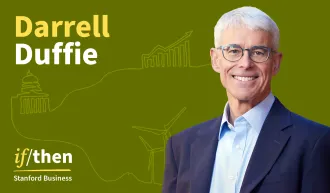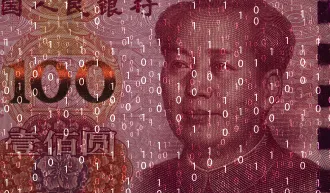A Provocative Theory of Identity Finds There is No “You” in Self
Brian Lowery presents a challenging look at our sense of self — and just how little say we have over it.
June 23, 2023

“You can’t be yourself by yourself,” Lowery writes. | Alvaro Dominguez
Who are you? Most of us assume that we’re the same person when we go to bed and when we wake up, whether we’re with friends or family, and whether we’re in San Francisco or hopping a flight to Fiji. And we believe that we hold the power to define ourselves.
Not so, says Brian Lowery, a professor of organizational behavior at Stanford Graduate School of Business. In his recent book, Selfless: The Social Creation of “You,” Lowery argues that the self is not a fixed, innate essence residing within us, but something fluid and socially constructed. The self exists only in relation to others, he posits, with implications for understanding social identity and our capacity for freedom. Lowery, a social psychologist, grounds his philosophical case in fascinating anecdotes from his life, the news, pop culture, and academia, including his own research. His theory offers an unconventional lens on current debates over race and gender identity.
Stanford Business spoke with Lowery about why he believes that “you can’t be yourself by yourself.” The conversation has been edited for length and clarity.
You moved around a lot as a kid, attending six different schools in Chicago alone before college. How did that affect your interest in and concept of the self?
It allowed me to see the effect of my environment on me and the people around me. If you stay in one place, you can mistake the stability of the environment for some kind of internal stability. At different schools, I saw people who seemed to be the same characters — the smart kid, the class clown — but, depending on the school, their trajectories were so different. I could see how the environment was shaping their life outcomes.
You write that it’s not possible to be your “true self,” as many self-help books urge. Why is that, and why can it feel so convincing that we do have an essential self?
From my perspective, the self is a social construction that is affected by the people you’re interacting with and unfolding in relationships. In that sense, the self is constantly evolving. If you accept that fluidity, I don’t know what it means to be “true,” because by “true” I assume most people mean real and unchanging. We accept that you can’t step in the same river twice. Every time you step in the river, it’s your true self, but it’s always different.
As David Hume talked about, there’s a sense of continuity to the self that we experience as stability. The changes are so subtle that we have an illusion of constancy. People are also committed to the idea that they’re stable because it provides a sense of coherence. We are trying to make sense of the world around us, and a self locates us in the world and tells us how we’re connected to other people. It centers us.
You argue that we don’t have as much agency as we’d like to believe. What do you mean, and how much freedom do we have?
Depending on what you define as freedom, maybe none at all. Would you want your ability to choose a romantic partner to be completely free? It seems that way, but I’m not sure that’s true. You have preferences for what they should look like, how they present their gender, what activities they should like, and all those things come from somewhere. You don’t see that as an impingement on your freedom, but these are constraints.
You are certainly influencing the world around you, but what is the source of that influence? It’s not you as some ineffable essence inside you, but you as a bearer of all of the influences of people who touched you. Maybe the issue isn’t agency, but the agent. When you say, “I’m free,” who is the “I” you’re talking about?
In the book, you discuss experiences with racism: getting arrested by the Chicago police at age 17 after refusing to be frisked for no reason, being accused of making up the fact that you’re a Stanford professor, having students assume that your white advisee is the professor rather than you. What do you make of these incidents in light of your view of the self?
In those moments, it was not so much that any of those individuals dictated who I was. But in the interactions, we created who I was — that’s a subtle but important distinction. It’s not as if someone thought I wasn’t a professor and that made me not a professor. But the interaction shifted who I was in that moment. Now, I’m seen as a Black man professor, and I’m engaging in that way as well. I might not have thought of myself as a Black man in that moment or context previously.
You describe a study in which you measured whether it was easier for people to connect negative words to Black or white faces that flashed imperceptibly quickly on a screen. When researchers wore a blank T-shirt, participants linked Black faces more easily to the word “bad.” When researchers wore a T-shirt that said “Eracism,” that effect disappeared. What does that tell us about the self?
At one point, people thought the implicit associations between Black and bad on one hand and white and good on the other were stable, because we are constantly exposed to such associations in our culture. The assumption was that if I expose you to something over and over, you internalize it, and it takes you being exposed to something else over and over to undo it. It’s connected to the stability of the self. This study showed that an implicit association — a thing you might not even know exists — can be changed by a simple interaction with someone you think holds a different belief.
You give the interesting example of Rachel Dolezal, who had identified as Black and resigned as president of a chapter of the NAACP when it emerged that her parents were white. You say that Dolezal was white, then Black, then neither. What do you mean, and what does this tell us about how we should view racial identity?
I’m taking seriously the idea that racial identity is a social construction. If she believes she’s Black, and everyone engages with her as if she’s Black, that makes her Black. In the book, I ask the questions: If she was one-eighth Black, is she Black? If she thought she was Black and was raised by Black parents but then discovered she didn’t have African ancestry, is she Black? Most people view race as essentialized, as if it is etched on your soul. If you take the notion of the soul away, most principles people use to define someone as Black don’t stand up to scrutiny. That doesn’t make these identities any less important or real.
In research from 2022, you found that people are more likely to treat women of their own background as “real” women, punishing them more when they stray from traditional norms of feminine behavior. Why is that?
I think that people see themselves in community with people from their racial group, and gender is conferred within communities. It doesn’t mean you don’t recognize someone’s sex, but it’s not given this social identity. If you’re outside the group, you’re not held to the same standards, but you’re not given the benefits of that either. Hypothetically, if you behave in a way that seems masculine but aren’t in my racial group, you’re not going to get in trouble, but I won’t provide you the same protection from violence.
If we accept your theory of the self, what are the implications for how we should live and interact with others?
I’m explicit in the book that I’m not prescriptive. My goal is for readers to ask themselves questions that change their experience. For me, every time I think about the ideas in the book, it makes me engage with people differently. I think, “How am I influencing them? How are we, in this moment, constructing each other? And what’s my responsibility in this interaction?” It changes my interactions in a way that is sometimes small and sometimes profound. We don’t often engage with each other’s humanity in this way. If you see that just a little bit, it will change how you move through life, what people give you and you give back.
What should organizations take away from your theory?
When you have direct reports, if something’s going wrong with how people are showing up, the first question you should ask is, “How am I co-creating that?” as opposed to, “What’s wrong with them?” There’s some way that you’re participating in what’s being produced. There’s not enough responsibility taken for that among some leaders.
Organizations are like nation-states. You are constructing an environment that shapes who the people within them can and will be. You’re shaping what people can conceive. Are you producing an environment that allows people to be who you need them to be?
For media inquiries, visit the Newsroom.
Explore More

Psst — Wanna Know Why Gossip Has Evolved in Every Human Society?

Hardwired for Hierarchy: Our Relationship With Power



